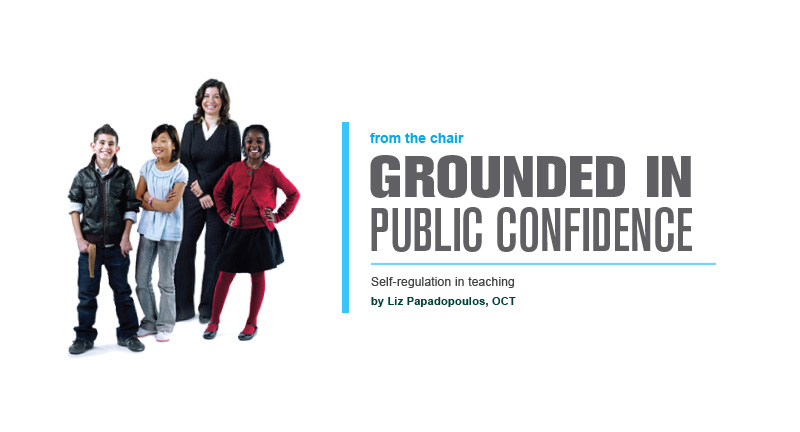
September always feels like a renewal, a fresh start. As we familiarize ourselves with new assignments, we are all beginning a new school year with different classrooms and new young shy smiles.
It certainly feels that way at the College. Members of the teaching profession voted for a new Council last spring. I would like to thank all of you who voted in the recent College Council election and to extend my thanks to Council for re-electing me as Chair.
Our front cover photo for this issue portrays former Ontario Chief Justice Patrick LeSage. He is the expert the College chose to do a comprehensive review of the College’s disciplinary process and practices, and he is every bit engaging and charming as he looks. He has provided us with wise and insightful advice to ensure that we continue to serve the public interest effectively and to inspire public confidence in the education system.
Reflection and review are cornerstones of our operational structure. We continually examine what we do and how we do it.
In June, we released the LeSage report and 49 recommendations — many calling on the College, the provincial government and district school boards to improve reporting and information-sharing processes. He has found areas where the College needs to improve in order to enhance public confidence in our profession’s ability to govern itself in the public interest.
As I begin my term as Chair of the sixth College Council, I’m very proud to have this opportunity to continue to serve our profession and to act swiftly on his recommendations.
The LeSage report focused on measures to improve the transparency and productivity of the entire investigation and discipline process to ensure it is conducted fairly, quickly and efficiently. By following through, we will assure the public that we treat complaints made against members of the profession in a timely manner. It is in the public’s best interest to have the process completed as quickly as possible. Victims have the right to expect we’ll do our work promptly.
Simply said, we have been told that we need to turn things around more quickly.
One way of doing so is to tighten timelines from the very beginning of an investigation. This means tighter timelines for reporting information about teacher misconduct or incompetence from boards to the College, from the College to members, and from the College to the public. Mr. LeSage recommends, for example, that we schedule consecutive full-day sittings for Discipline panel members so that they can hear a case and dispose of a matter without delay.
Most Council members are teachers who face the challenge of balancing their work at the College with their teaching duties. As disciplinary cases need to be heard more quickly, the next few years will be challenging for the members of your new College Council as we attempt to fulfill the report’s recommendations.
In June, the previous College Council approved 43 of the 49 recommendations in the LeSage report and asked for more information on six of them. More than half the recommendations require changes to Ontario laws. The College has already forwarded 26 of the 49 recommendations to Ontario’s Minister of Education for action.
When College members elected the sixth Council, they elected an outstanding group of individuals to govern our profession. These men and women understand the complexities of our profession and will bring their own insightful wisdom to the debate as we work to implement this ambitious agenda.
We will keep you posted on our progress.
